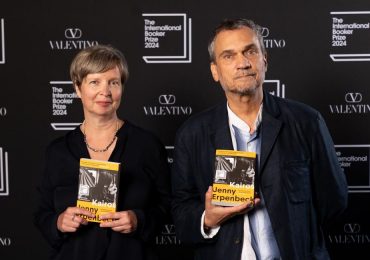Author Georgi Gospodinov and translator Angela Rodel have been announced as the winners of the 2023 International Booker Prize for the novel Time Shelter.
Time Shelter, Gospodinov’s fourth book to be translated into English, is the first book written in Bulgarian to win the prize. The novel was published in Bulgarian in 2020, becoming a bestseller, and the Italian translation won the Strega European Prize.
The International Booker Prize, which celebrates ‘the finest translated fiction from around the world’, is awarded every year for a single book translated into English and published in the United Kingdom or Ireland. It aims to encourage more publishing and reading of translated fiction and to promote the work of translators.
The £50,000 prize money (about R1,2 million) will be split between Gospodinov and Rodel, as the author and translator are given equal recognition for the prize.
In Time Shelter, a ‘clinic for the past’ offers a promising treatment for Alzheimer’s sufferers: each floor reproduces a decade in minute detail, transporting patients back in time. But soon the past begins to invade the present.
‘My urge to write this book came from the sense that something had gone awry in the clockworks of time,’ Gospodinov said. ‘You could catch the scent of anxiety hanging in the air, you could touch it with your finger. After 2016 we seemed to be living in another world and another time. The world’s disintegration with the encroachment of populism and playing the card of the “great past” in the US and in Europe provoked me. Brexit was the other trigger.
‘I come from a system that sold a “bright future” under communism. Now the stakes have shifted, and populists are selling a”bright past”. I know via my own skin that both cheques bounce, they are backed by nothing. And that’s why I wanted to tell this story about the “referendums on the past”, undertaken by every European country. How does one live with a deficit of meaning and future? What do we do when the pandemic of the past engulfs us?’
This year’s panel of judges is chaired by the prize-winning French-Moroccan novelist, Leïla Slimani, and includes Uilleam Blacker, one of Britain’s leading literary translators from Ukrainian; Tan Twan Eng, the Booker-shortlisted Malaysian novelist; Parul Sehgal, staff writer and critic at the New Yorker; and Frederick Studemann, Literary Editor of the Financial Times.
Slimani called Time Shelter ‘a brilliant novel, full of irony and melancholy’.
‘It is a profound work,’ she continued, ‘that deals with a very contemporary question: What happens to us when our memories disappear? Georgi Gospodinov succeeds marvellously in dealing with both individual and collective destinies and it is this complex balance between the intimate and the universal that convinced and touched us.
‘In scenes that are burlesque as well as heartbreaking, he questions the way in which our memory is the cement of our identity and our intimate narrative. But it is also a great novel about Europe, a continent in need of a future, where the past is reinvented, and nostalgia is a poison. It offers us a perspective on the destiny of countries like Bulgaria, which have found themselves at the heart of the ideological conflict between the West and the communist world.
‘It is a novel that invites reflection and vigilance as much as it moves us, because the language—sensitive and precise—manages to capture, in a Proustian vein, the extreme fragility of the past. And it mixes, in its very form, a great modernity with references to the major texts of European literature, notably through the character of Gaustine, an emanation from a world on the verge of extinction.
‘The translator, Angela Rodel, has succeeded brilliantly in rendering this style and language, rich in references and deeply free. The past is only ever a story that is told. And not all storytellers have the talent of Georgi Gospodinov and Angela Rodel.’
Gospodinov and Rodel were up against a shortlist that included The Gospel According to the New World by Maryse Condé, translated from French by her husband Richard Philcox; Standing Heavy by GauZ’, translated from French by Frank Wynne; Eva Baltasar’s Boulder, translated by Julia Sanches from Catalan; Whale by Cheon Myeong-kwan, translated from Korean by Chi-Young Kim; and Still Born by Guadalupe Nettel, translated from Spanish by Rosalind Harvey.
Last year’s winner of the International Booker Prize was Tomb of Sand, written by Geetanjali Shree and translated from Hindi by Daisy Rockwell.





